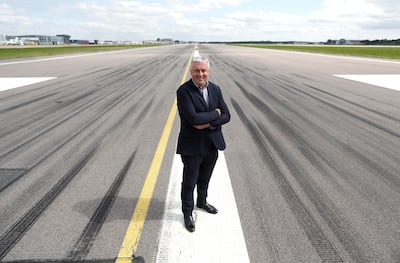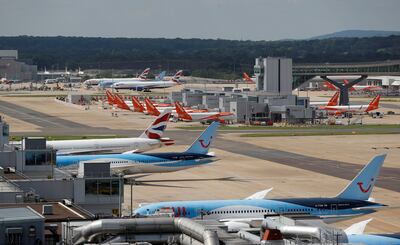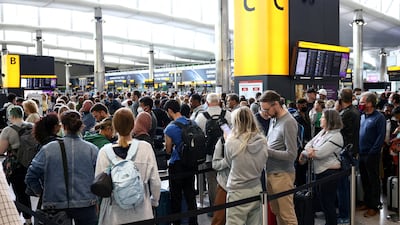Post-pandemic the airport business is certainly back to rude health but whether or not the traveller is well served is certainly being tested to the limit.
It is early Sunday morning on the way to Greece and the dawn lines of people waiting to check in are well-formed. Occasionally a woman with a clipboard shouts out the number of a flight that will soon take off. Its passengers are allowed to go to the front of the queue and are hurried through, otherwise they would miss the plane.
We’re flying British Airways but we’re not allowed to check in online, not sure why. Not that it would make a difference, because across the hall the numbers dropping their bags off and inching forward are just as great.
Checking in takes us almost an hour. Then comes security. It’s mercifully quicker.
We’re through and can relax and have breakfast, except there is only half an hour left. We have no time to queue again, order and eat anything.
This, having been told to check in two hours before departure. When our gate is shown, it’s 34 – miles away and there’s no travelator. Except there is. For reasons unexplained, there is a 30-metre stretch of travelator, then nothing but corridor. But that 30-metre bit is also shut, with cones and a barrier at each end.
Then I open the Sunday Times and read an interview with Stewart Wingate, the boss of Gatwick. It is timed ahead of planned strikes by 1,000 baggage handlers at the airport, starting at the end of this month.
Wingate wants to convey the message that they are not employed by the airport but by the airlines. “I think in recent years, passengers have started to realise that [the baggage handlers] are under contract to the airlines.”
Presumably, that’s what he would say about the lack of BA desk staff: “Not my problem, guv.”
But it is your problem, Stewart. It’s precisely your problem. Passengers, whatever he likes to believe, don’t distinguish between who employs who. We view the whole process in the round, and it’s dreadful.
Indeed, Wingate himself says as much, when in the next breath he defends Gatwick’s record last year. The airport had to put a cap on flights because of staff shortages. These limits were gradually raised through the summer and, because of its “collegiate approach” with airlines, Wingate said, Gatwick had a “normal amount of cancellations” in the peak season.
He’s having a dig at Heathrow, his rival, which had to tell airlines to stop selling tickets as it could not cope with demand.
Then Wingate says, that for this summer: “We’ve put an awful lot of effort into making sure that the experience is going to be a good one, with a particular focus on getting passengers through security quickly.”
There you have it. That overused word. The “experience”. Stewart, get down there at 5.30am and see for yourself. Take the journey from the moment you arrive, all the way to departure, and ask, is the “experience” good? Use that “collegiality” as you call it, to roast BA, to tell them to stop treating people like commodities. Both of you, cease taking us for granted.
Wingate is on surer ground when talking about improvements to Gatwick’s infrastructure. A new £47 million railway station is due to open later this year, a new multistorey car park is coming soon (car parks contributed 13 per cent of Gatwick’s £777 million sales last year), and he wants to build a second runway. If he receives permission for the latter, the airport’s capacity will increase by 19 per cent by 2030.
This, in a nutshell, is where we are with UK airports. Their chiefs talk constantly about passenger totals. Their proud boast at present is that the industry has bounced back from Covid, that levels are up to 90 per cent pre-pandemic.
They’re only set to rise further. But therein lies the difficulty: the UK’s main airports cannot cope with existing traffic. How will they perform when the outbreak becomes a distant memory and global air travel soars, as it is predicted to?
Wingate, or for that matter his opposite numbers at Heathrow and the rest, hailing additions to their transport connections is one thing; obliging the airlines to step up and concentrate on the ground side part of the journey as opposed to the air side, which they love to regale us with in their advertising, is quite another.
There is no sign of any commensurate improvement at the airport end, not from the traveller’s perspective
The airports are very good at hiking their fees to the airlines – the carriers are always complaining about the extra charges. Likewise, fares continue to climb. But there is no sign of any commensurate improvement at the airport end, not from the traveller’s perspective.
Perish the thought, that the blurring over who is responsible for what, suits them just perfectly. How can BA make proud boasts in its promotions, yet its desks are unmanned and the lines go out of the door? More to the point, how is it allowed to?
And not only BA, but other carriers which do not hire enough staff and are not bothered if their customers must queue for ages. They sell the seats after all.
Why do Wingate and the others – Heathrow is little different – let it happen? Could it be they’re locked in a conspiracy of complacency, intent on making more money, extracting ever greater amounts of revenue, and the passenger, the person at the bottom of the pile, is there to be forgotten.
Taking an hour to get through check-in, shrugging and saying it’s not my fault when the bags take forever to reach the conveyor will not do. UK airports do not seem to realise they are in the service business, not in the robotic processing of tens of millions of passengers.
It’s their decision to outsource. It’s their decision to not man their check-in desks. We, the suffering travelling public, are entitled to a better, what is that word again, “experience”.
Milestones on the road to union
1970
October 26: Bahrain withdraws from a proposal to create a federation of nine with the seven Trucial States and Qatar.
December: Ahmed Al Suwaidi visits New York to discuss potential UN membership.
1971
March 1: Alex Douglas Hume, Conservative foreign secretary confirms that Britain will leave the Gulf and “strongly supports” the creation of a Union of Arab Emirates.
July 12: Historic meeting at which Sheikh Zayed and Sheikh Rashid make a binding agreement to create what will become the UAE.
July 18: It is announced that the UAE will be formed from six emirates, with a proposed constitution signed. RAK is not yet part of the agreement.
August 6: The fifth anniversary of Sheikh Zayed becoming Ruler of Abu Dhabi, with official celebrations deferred until later in the year.
August 15: Bahrain becomes independent.
September 3: Qatar becomes independent.
November 23-25: Meeting with Sheikh Zayed and Sheikh Rashid and senior British officials to fix December 2 as date of creation of the UAE.
November 29: At 5.30pm Iranian forces seize the Greater and Lesser Tunbs by force.
November 30: Despite a power sharing agreement, Tehran takes full control of Abu Musa.
November 31: UK officials visit all six participating Emirates to formally end the Trucial States treaties
December 2: 11am, Dubai. New Supreme Council formally elects Sheikh Zayed as President. Treaty of Friendship signed with the UK. 11.30am. Flag raising ceremony at Union House and Al Manhal Palace in Abu Dhabi witnessed by Sheikh Khalifa, then Crown Prince of Abu Dhabi.
December 6: Arab League formally admits the UAE. The first British Ambassador presents his credentials to Sheikh Zayed.
December 9: UAE joins the United Nations.
KILLING OF QASSEM SULEIMANI
The National's picks
4.35pm: Tilal Al Khalediah
5.10pm: Continous
5.45pm: Raging Torrent
6.20pm: West Acre
7pm: Flood Zone
7.40pm: Straight No Chaser
8.15pm: Romantic Warrior
8.50pm: Calandogan
9.30pm: Forever Young
If you go
Flight connections to Ulaanbaatar are available through a variety of hubs, including Seoul and Beijing, with airlines including Mongolian Airlines and Korean Air. While some nationalities, such as Americans, don’t need a tourist visa for Mongolia, others, including UAE citizens, can obtain a visa on arrival, while others including UK citizens, need to obtain a visa in advance. Contact the Mongolian Embassy in the UAE for more information.
Nomadic Road offers expedition-style trips to Mongolia in January and August, and other destinations during most other months. Its nine-day August 2020 Mongolia trip will cost from $5,250 per person based on two sharing, including airport transfers, two nights’ hotel accommodation in Ulaanbaatar, vehicle rental, fuel, third party vehicle liability insurance, the services of a guide and support team, accommodation, food and entrance fees; nomadicroad.com
A fully guided three-day, two-night itinerary at Three Camel Lodge costs from $2,420 per person based on two sharing, including airport transfers, accommodation, meals and excursions including the Yol Valley and Flaming Cliffs. A return internal flight from Ulaanbaatar to Dalanzadgad costs $300 per person and the flight takes 90 minutes each way; threecamellodge.com
UAE tour of Zimbabwe
All matches in Bulawayo
Friday, Sept 26 – UAE won by 36 runs
Sunday, Sept 28 – Second ODI
Tuesday, Sept 30 – Third ODI
Thursday, Oct 2 – Fourth ODI
Sunday, Oct 5 – First T20I
Monday, Oct 6 – Second T20I
Learn more about Qasr Al Hosn
In 2013, The National's History Project went beyond the walls to see what life was like living in Abu Dhabi's fabled fort:
UAE currency: the story behind the money in your pockets
Medicus AI
Started: 2016
Founder(s): Dr Baher Al Hakim, Dr Nadine Nehme and Makram Saleh
Based: Vienna, Austria; started in Dubai
Sector: Health Tech
Staff: 119
Funding: €7.7 million (Dh31m)
It Was Just an Accident
Director: Jafar Panahi
Stars: Vahid Mobasseri, Mariam Afshari, Ebrahim Azizi, Hadis Pakbaten, Majid Panahi, Mohamad Ali Elyasmehr
Rating: 4/5
How much do leading UAE’s UK curriculum schools charge for Year 6?
- Nord Anglia International School (Dubai) – Dh85,032
- Kings School Al Barsha (Dubai) – Dh71,905
- Brighton College Abu Dhabi - Dh68,560
- Jumeirah English Speaking School (Dubai) – Dh59,728
- Gems Wellington International School – Dubai Branch – Dh58,488
- The British School Al Khubairat (Abu Dhabi) - Dh54,170
- Dubai English Speaking School – Dh51,269
*Annual tuition fees covering the 2024/2025 academic year
Company profile
Name: Thndr
Started: October 2020
Founders: Ahmad Hammouda and Seif Amr
Based: Cairo, Egypt
Sector: FinTech
Initial investment: pre-seed of $800,000
Funding stage: series A; $20 million
Investors: Tiger Global, Beco Capital, Prosus Ventures, Y Combinator, Global Ventures, Abdul Latif Jameel, Endure Capital, 4DX Ventures, Plus VC, Rabacap and MSA Capital
Key features of new policy
Pupils to learn coding and other vocational skills from Grade 6
Exams to test critical thinking and application of knowledge
A new National Assessment Centre, PARAKH (Performance, Assessment, Review and Analysis for Holistic Development) will form the standard for schools
Schools to implement online system to encouraging transparency and accountability
DUBAI%20BLING%3A%20EPISODE%201
%3Cp%3E%3Cstrong%3ECreator%3A%20%3C%2Fstrong%3ENetflix%3C%2Fp%3E%0A%3Cp%3E%3Cstrong%3EStars%3A%20%3C%2Fstrong%3EKris%20Fade%2C%20Ebraheem%20Al%20Samadi%2C%20Zeina%20Khoury%3C%2Fp%3E%0A%3Cp%3E%3Cstrong%3ERating%3A%3C%2Fstrong%3E%202%2F5%3C%2Fp%3E%0A
Liverpool's all-time goalscorers
Ian Rush 346
Roger Hunt 285
Mohamed Salah 250
Gordon Hodgson 241
Billy Liddell 228
Know before you go
- Jebel Akhdar is a two-hour drive from Muscat airport or a six-hour drive from Dubai. It’s impossible to visit by car unless you have a 4x4. Phone ahead to the hotel to arrange a transfer.
- If you’re driving, make sure your insurance covers Oman.
- By air: Budget airlines Air Arabia, Flydubai and SalamAir offer direct routes to Muscat from the UAE.
- Tourists from the Emirates (UAE nationals not included) must apply for an Omani visa online before arrival at evisa.rop.gov.om. The process typically takes several days.
- Flash floods are probable due to the terrain and a lack of drainage. Always check the weather before venturing into any canyons or other remote areas and identify a plan of escape that includes high ground, shelter and parking where your car won’t be overtaken by sudden downpours.
MATCH INFO
Norwich 0
Watford 2 (Deulofeu 2', Gray 52')
Red card: Christian Kabasele (WatforD)
Springsteen: Deliver Me from Nowhere
Director: Scott Cooper
Starring: Jeremy Allen White, Odessa Young, Jeremy Strong
Rating: 4/5




